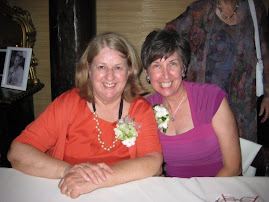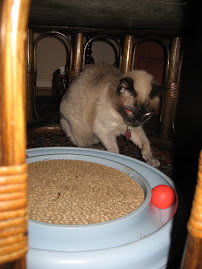
Sitting on the screened-in back porch of my house makes me feel like a child sitting in a tree house. Situated one story above ground level, I can almost touch the leaves of the oak trees that embrace me on three sides. I am no longer a child. I am 65 years old and was lucky to find this house almost nine years ago. The house where I lived for 27 years prior to moving here was the home where I lived the hectic life of wife, mother of two sons, hard-working educator and active community citizen. After my divorce, I knew I had found the right house when I saw the back yard of this property. The abundance of trees in a natural wooded area that backed on my house gave me all the natural beauty and all the privacy that I needed. Unless a tree falls in a storm (as it did the first year I lived here) I have very little maintenance in the back of the house. Instead, I have a personal sanctuary for admiring the noble beauty of the tall stately oaks, tulip poplars and pine trees, a veritable nature preserve where squirrels chase each other in spirals around the trunks of the trees and birds sing to each other as they fly from branch to branch. The light in the trees changes as many times as there are hours in the day. Less than ½ mile from my porch are the Civil War battlefields that make this part of Virginia a celebrated and reverent reminder of the history of our country.

When I awoke this morning, I made myself a cup of tea and came out to sit on the porch with my Siamese cat Coco Chanel. The teak rocking chair in the outer corner of the porch is her favorite resting place. She is now 17 years old and doesn’t prance around like she used to do. Most of her time is spent sleeping but her ears still perk up at the sound of a bird or the sudden splashes of light as the rays of the morning sun move through the canopy of trees overhead. I am amazed at the change in temperature. Yesterday it was 98 degrees. After last night’s thunderstorm, this morning it is a brisk 68 degrees, forcing me to go back into the house to get a light wrap to cover my shoulders and bare arms.

For eight or nine months of the year, I make use of my humble perch in the woods. But the sweetest time is summer. In the distance I hear the steady humming of traffic from the nearby boulevard, as well as the slightly louder but not unpleasant sound of a lawn mower two houses away. The blowing of the train whistle reminds me that the larger world is passing through, making it easier for me to take off on unexpected adventures. It’s a peaceful way to spend the day, just close enough to hear the sounds of the town but secluded enough to feel protected and safe. Even the sound of the fire truck that I hear in the distance provides a sense of comfort despite the alarm it sounds. It reminds me that I am part of a community that is prepared for the emergencies that are part of everyday life.

I wonder how long I, like Coco Chanel, will be content to stay here and be enfolded in the security of my surroundings. I can already feel the pull of the hours passing. I have tasks to be accomplished today that will tear me from the peace and harmony which bless me this morning. Just as Coco moves from her perch on the rocking chair to join me on the soft cushions of my porch furniture, I feel the urge to reach out for the warmth and companionship of another. But I hesitate. I’m not sure if the presence of another being would add to or reduce the sense of peace that I feel. My Coco knows that she will get from me exactly what she needs—a stroke on the neck, a scratch on the back, and the warmth of a soft lap. If only we could count on that same sense of reassuring comfort and unconditional love from all those who touch our lives. Don’t we all yearn for companionship? But at what price?













